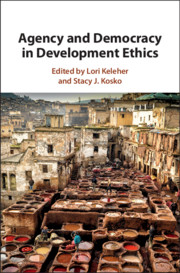Book contents
- Agency and Democracy in Development Ethics
- Agency and Democracy in Development Ethics
- Copyright page
- Dedication
- Contents
- Figures
- Tables
- Contributors
- Acknowledgments
- Introduction
- A Note from David A. Crocker
- Part I Development Ethics
- Part II Agency
- Part III Democracy
- Part IV Development Ethics, Agency, and Democracy
- Index
- References
Part II - Agency
Published online by Cambridge University Press: 26 February 2019
- Agency and Democracy in Development Ethics
- Agency and Democracy in Development Ethics
- Copyright page
- Dedication
- Contents
- Figures
- Tables
- Contributors
- Acknowledgments
- Introduction
- A Note from David A. Crocker
- Part I Development Ethics
- Part II Agency
- Part III Democracy
- Part IV Development Ethics, Agency, and Democracy
- Index
- References
- Type
- Chapter
- Information
- Agency and Democracy in Development Ethics , pp. 153 - 288Publisher: Cambridge University PressPrint publication year: 2019
References
References
References
References
References
References
Cases Cited
Cetacean Community v. Bush, 386 F. 3d 1169 (9th Cir. 2004).
Friends of the Earth, Inc. v. Laidlaw Envtl. Servs. (TOC), Inc., 528 US 167 (2000).
Nair v. Union of India, Kerala High Court, no.15/1999, June 2000.
Natural Resources Defense Council et al. v. Pritzker et al., no.14–16375 (9th Cir. 2016).
Palila v. Hawaii Department of Land and Natural Resources, 852 F. 2d 1106 (9th Cir. 1988).
Tilikum ex rel. People for the Ethical Treatment of Animals, Inc. v. Sea World Parks and Entertainment, Inc. 842 F. Supp.2d 1259 (SD Ca. 2012).



